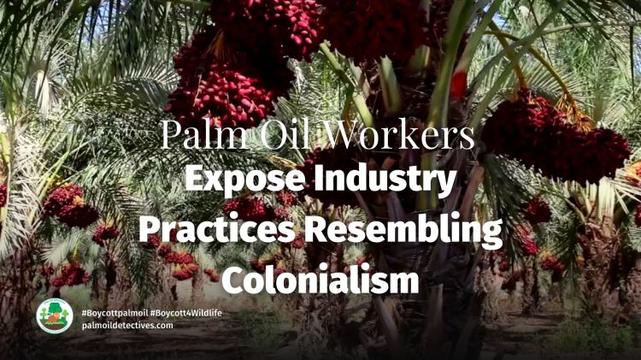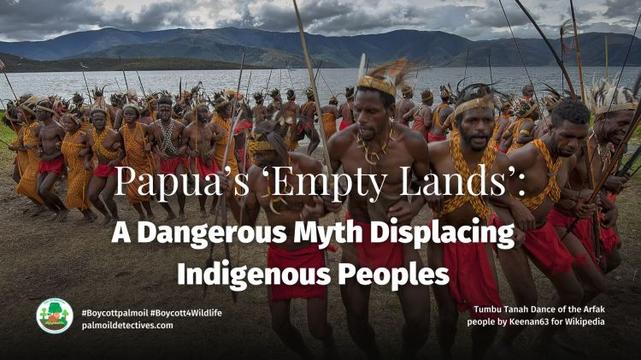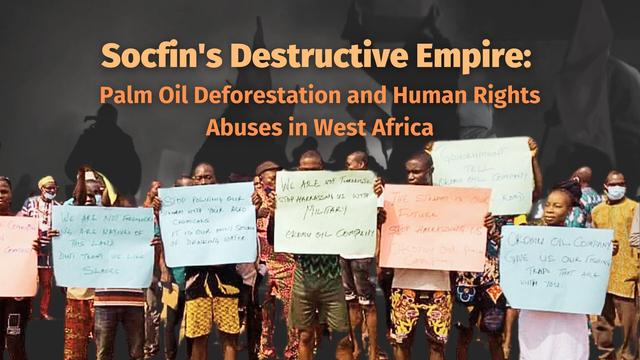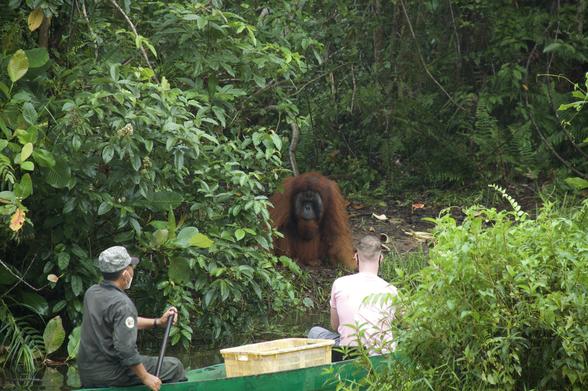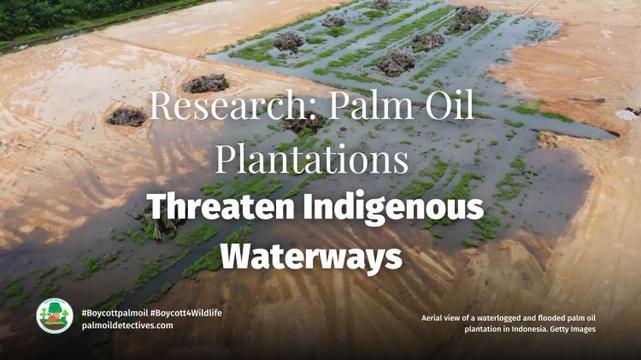The #Soviet vision of seamless transformation – e.g., converting peatlands into energy sources and arable land, and people into compliant laborers – was largely realized but left behind traces of persistent violence, as Jeanna Kolesova argues: https://berlinergazette.de/witnesses-or-resources-on-peat-laboring-bodies-and-imperial-practice/ #Climate #ClimateChange #ClimateCrisis #labor #landgrabbing #ecology #imperialism #Russia #RussiaUkraineWar
#LandGrabbing
#News: Indonesian #palmoil workers reveal industry practices they liken to #colonial exploitation, including #landgrabbing and poor labor conditions. #HumanRights #IndigenousRights #BoycottPalmOil 🌴⛔️ @palmoildetectives https://wp.me/pcFhgU-9Pm
Palm Oil Workers Expose Industry Practices Resembling Colonialism
Palm Oil Workers Expose Industry Practices Resembling Colonialism | A coalition of palm oil workers in Indonesia has unveiled industry practices that mirror colonial exploitation, including land grabbing, poor working conditions, and environmental degradation. These revelations highlight the urgent need to address systemic issues within the palm oil sector and advocate for indigenous rights. #HumanRights #IndigenousRights #BoycottPalmOil
#News: Indonesian #palmoil workers reveal industry practices they liken to #colonial exploitation, including #landgrabbing and poor labor conditions. #HumanRights #IndigenousRights #BoycottPalmOil 🌴⛔️ @palmoildetect https://wp.me/pcFhgU-9Pm
Share to BlueSky Share to TwitterTempo.co. (2024, December 20). Palm oil workers’ group unveils harmful industry practices akin to colonialism. Retrieved from https://en.tempo.co/read/1957496/palm-oil-workers-group-unveils-harmful-industry-practices-akin-to-colonialism
In a recent exposé, a coalition representing palm oil workers in Indonesia has brought to light industry practices that they equate to modern-day colonialism. The group highlights several critical issues, including land appropriation from indigenous communities, substandard working conditions, and significant environmental harm resulting from palm oil cultivation.
The coalition points to instances where large palm oil corporations have seized ancestral lands without proper consent or compensation, displacing indigenous populations and disrupting their traditional way of life. Workers within the industry report facing hazardous conditions, inadequate wages, and a lack of labour rights protections, drawing parallels to exploitative colonial labour systems.
Environmental concerns are also at the forefront, with the expansion of palm oil plantations leading to deforestation, loss of biodiversity, and increased greenhouse gas emissions. These practices not only harm the ecosystem but also undermine the livelihoods of local communities dependent on forest resources.
The coalition is calling for comprehensive reforms in the palm oil industry, emphasising the need for policies that respect indigenous land rights, ensure fair labor standards, and promote environmentally sustainable practices. They urge consumers and policymakers to support initiatives that hold corporations accountable and advocate for ethical sourcing of palm oil.
For a detailed account, read the full article on Tempo.co.
Tempo.co. (2024, December 20). Palm oil workers’ group unveils harmful industry practices akin to colonialism. Retrieved from https://en.tempo.co/read/1957496/palm-oil-workers-group-unveils-harmful-industry-practices-akin-to-colonialism
ENDS
Read more about human rights abuses and child slavery in the palm oil industry
Palm Oil Workers Expose Industry Practices Resembling Colonialism
Palm Oil Workers Expose Industry Practices Resembling Colonialism | A coalition of palm oil workers in Indonesia has unveiled industry practices that mirror colonial exploitation, including land grabbing, poor working conditions, and environmental…
Papua’s ‘Empty Lands’: A Dangerous Myth Displacing Indigenous Peoples
In #WestPapua, on illegally colonised and disputed land taken by violence from Melanesian Indigenous peoples last century by Indonesian forces, authorities label indigenous lands as “empty”. This is done in order to justify…
Research: Palm Oil Plantations Threaten Indigenous Waterways
Research: Palm Oil Plantations Threaten Indigenous Waterways | A study by the University of Massachusetts Amherst reveals that the expansion of oil palm plantations in West Papua’s Kais River watershed has significantly degraded…
New Research: Indigenous Communities Reduce Amazon Deforestation by 83%”
Although #deforestation rates in the Brazilian #Amazon have halved, this globally critical biome is still losing more than 5,000km² every year. That’s an area three times larger than Greater London. By combining satellite…
Concerns Mount Over Palm Oil Expansion in Nagaland
Concerns Mount Over Palm Oil Expansion in Nagaland | The Nagaland Climate Change Adaptation Forum (NCCAF) has raised grave concerns about the environmental and social impacts of expanding palm oil plantations in the…
Load more posts
Something went wrong. Please refresh the page and/or try again.
Take Action in Five Ways
1. Join the #Boycott4Wildlife on social media and subscribe to stay in the loop: Share posts from this website to your own network on Twitter, Mastadon, Instagram, Facebook and Youtube using the hashtags #Boycottpalmoil #Boycott4Wildlife.
Enter your email address
Sign Up
Join 1,391 other subscribers2. Contribute stories: Academics, conservationists, scientists, indigenous rights advocates and animal rights advocates working to expose the corruption of the palm oil industry or to save animals can contribute stories to the website.
Mel Lumby: Dedicated Devotee to Borneo’s Living Beings
Anthropologist and Author Dr Sophie Chao
Health Physician Dr Evan Allen
The World’s Most Loved Cup: A Social, Ethical & Environmental History of Coffee by Aviary Doert
How do we stop the world’s ecosystems from going into a death spiral? A #SteadyState Economy
3. Supermarket sleuthing: Next time you’re in the supermarket, take photos of products containing palm oil. Share these to social media along with the hashtags to call out the greenwashing and ecocide of the brands who use palm oil. You can also take photos of palm oil free products and congratulate brands when they go palm oil free.
https://twitter.com/CuriousApe4/status/1526136783557529600?s=20
https://twitter.com/PhillDixon1/status/1749010345555788144?s=20
https://twitter.com/mugabe139/status/1678027567977078784?s=20
4. Take to the streets: Get in touch with Palm Oil Detectives to find out more.
5. Donate: Make a one-off or monthly donation to Palm Oil Detectives as a way of saying thank you and to help pay for ongoing running costs of the website and social media campaigns. Donate here
Pledge your support#BoycottPalmOil #Boycott4wildlife #BoycottPalmOil #childLabour #childSlavery #colonial #humanRights #HumanRights #indigenousRights #indigenousrights #landRights #landgrabbing #News #PalmOil #palmoil #slavery
#News: Indonesian #palmoil workers reveal industry practices they liken to #colonial exploitation, including #landgrabbing and poor labor conditions. #HumanRights #IndigenousRights #BoycottPalmOil 🌴⛔️
"Hollywood has shaped our subjectivity to turn a blind eye to Palestine, says activist
Marie Anges Bordas develops projects with refugee children and children from traditional communities in Brazil and around the world" interview in Pt
#WeAreAllPalestinians #StarvationAsWeapon #IsraelTerroristState #Genocide #Colonialism #LandGrabbing
Papua’s ‘Empty Lands’: A Dangerous Myth Displacing Indigenous Peoples
In #WestPapua, on illegally colonised and disputed land taken by violence from Melanesian Indigenous peoples last century by Indonesian forces, authorities label indigenous lands as “empty”. This is done in order to justify large-scale agricultural projects, displacing tribes like the #Malind and Khimaima peoples. These lands are vital sources of food and medicine, supporting traditional ways of life for several millennia. Communities and indigenous rights advocates call for halting exploitative #palmoil and #mining projects and honouring #LandRights #HumanRights #IndigenousRights #BoycottPalmOil
🌏 #News: In #WestPapua, “empty lands” are NOT empty—they sustain countless #indigenous #Malind and #Khimaima people for millennia. Large-scale #palmoil projects destroy livelihoods. Support #HumanRights #IndigenousRights and #BoycottPalmOil 🌴🪔🧐⛔️ https://wp.me/pcFhgU-a5N
Share to BlueSky Share to TwitterPapua’s Indigenous Communities Resist the ‘Empty Land’ Narrative
A controversial narrative labelling indigenous lands in Papua, Indonesia, as “empty” is fuelling and legitimsing large-scale agricultural projects that threaten the livelihoods of local tribes. The government’s food estate initiative has displaced indigenous communities, including the Malind, Maklew, Yei, and Khimaima tribes, who have depended on these lands for thousands of years.
A Source of Life, Not an Empty Land
The forests of Papua are far from vacant. They provide essential resources, including sago and other medicinal plants, sustaining the daily lives of indigenous peoples. These areas are deeply rooted in cultural and spiritual practices, making their loss devastating not just economically but also culturally.
Impact of Large-Scale Agriculture
Under the guise of “development,” projects like the food estate initiative restrict access to ancestral forests, impose security measures, and prioritise corporate profits over indigenous welfare. Such ventures often proceed without consulting or compensating local communities, exacerbating social and environmental injustices.
A Call to Respect Indigenous Sovereignty
Human rights advocates stress the need to protect indigenous land rights and halt exploitative practices. They demand inclusive policies that respect traditional knowledge and empower communities to manage their resources sustainably.
This issue underscores the importance of recognising indigenous sovereignty as central to ethical land use and environmental protection. The international community is urged to hold governments and corporations accountable for policies that displace indigenous people and degrade their ecosystems.
For more details, read the full article on Farm Land Grab.
Farmland Grab. (2025, January 25). Papua land is never empty, it is a source of livelihood for many. Retrieved January 28, 2025, from https://farmlandgrab.org/post/32579.
ENDS
Read more about human rights abuses and child slavery in the palm oil industry
Papua’s ‘Empty Lands’: A Dangerous Myth Displacing Indigenous Peoples
In #WestPapua, on illegally colonised and disputed land taken by violence from Melanesian Indigenous peoples last century by Indonesian forces, authorities label indigenous lands as “empty”. This is done in order to justify…
Research: Palm Oil Plantations Threaten Indigenous Waterways
Research: Palm Oil Plantations Threaten Indigenous Waterways | A study by the University of Massachusetts Amherst reveals that the expansion of oil palm plantations in West Papua’s Kais River watershed has significantly degraded…
New Research: Indigenous Communities Reduce Amazon Deforestation by 83%”
Although #deforestation rates in the Brazilian #Amazon have halved, this globally critical biome is still losing more than 5,000km² every year. That’s an area three times larger than Greater London. By combining satellite…
Concerns Mount Over Palm Oil Expansion in Nagaland
Concerns Mount Over Palm Oil Expansion in Nagaland | The Nagaland Climate Change Adaptation Forum (NCCAF) has raised grave concerns about the environmental and social impacts of expanding palm oil plantations in the…
Palm Oil Is Ruining Kalangala Uganda — Locals Paying the Price
A catastrophic storm in #Uganda’s Kalangala district left nearly 1,000 households homeless. The real culprit? Rampant #deforestation for #palmoil. Once rich in native forests that buffered storms, Kalangala is now a fragile landscape…
Load more posts
Something went wrong. Please refresh the page and/or try again.
Take Action in Five Ways
1. Join the #Boycott4Wildlife on social media and subscribe to stay in the loop: Share posts from this website to your own network on Twitter, Mastadon, Instagram, Facebook and Youtube using the hashtags #Boycottpalmoil #Boycott4Wildlife.
Enter your email address
Sign Up
Join 1,389 other subscribers2. Contribute stories: Academics, conservationists, scientists, indigenous rights advocates and animal rights advocates working to expose the corruption of the palm oil industry or to save animals can contribute stories to the website.
Mel Lumby: Dedicated Devotee to Borneo’s Living Beings
Anthropologist and Author Dr Sophie Chao
Health Physician Dr Evan Allen
The World’s Most Loved Cup: A Social, Ethical & Environmental History of Coffee by Aviary Doert
How do we stop the world’s ecosystems from going into a death spiral? A #SteadyState Economy
3. Supermarket sleuthing: Next time you’re in the supermarket, take photos of products containing palm oil. Share these to social media along with the hashtags to call out the greenwashing and ecocide of the brands who use palm oil. You can also take photos of palm oil free products and congratulate brands when they go palm oil free.
https://twitter.com/CuriousApe4/status/1526136783557529600?s=20
https://twitter.com/PhillDixon1/status/1749010345555788144?s=20
https://twitter.com/mugabe139/status/1678027567977078784?s=20
4. Take to the streets: Get in touch with Palm Oil Detectives to find out more.
5. Donate: Make a one-off or monthly donation to Palm Oil Detectives as a way of saying thank you and to help pay for ongoing running costs of the website and social media campaigns. Donate here
Pledge your support#BoycottPalmOil #Boycott4wildlife #BoycottPalmOil #childLabour #childSlavery #humanRights #HumanRights #indigenous #indigenousRights #indigenousrights #Khimaima #landRights #landgrabbing #landrights #Malind #mining #News #PalmOil #palmoil #slavery #WestPapua
“Sustainable” #palmoil and rubber co. and #RSPO member SOCFIN is on a decades long rampage of violent #landgrabbing and #ecocide in #Ghana and Nigeria. Help local communities to fight back against #humanrights abuses when you #Boycottpalmoil @palmoildetect.bsky.social
https://wp.me/pcFhgU-8H0?utm_source=mastodon&utm_medium=Palm+Oil+Detectives&utm_campaign=publer
https://palmoildetectives.com/2021/10/22/greenwashing/ Ten Tactics of ‘Sustainable’ Palm Oil Greenwashing. #Boycott4Wildlife #Boycottpalmoil #FightGreenwashing #palmoil #corruption #deforestation #landgrabbing
#News: 🚨 #SOCFIN #palmoil and #rubber is linked to sexual #violence, forced #labour, #landgrabbing #deforestation in #WestAfrica🌴🔥🤢☠️🙊🚫 French tycoon Vincent Bolloré profits while communities suffer. 💀✊🏽 #BoycottPalmOil #Boycott4Wildlife https://www.bloomberg.com/features/2025-socfin-plantations?utm_source=mastodon&utm_medium=Palm+Oil+Detectives&utm_campaign=publer
Land grabbing / land theft indeed:
"It’s been so transparently obvious this entire time that Israel’s entire objective is to remove Palestinians from a Palestinian territory so their land can be used for Israel’s own purposes — but you’d never have known it from looking at the western press.
For the last year and a half the western media have been brazenly lying to the public by framing this as a “war with Hamas” instead of the naked ethnic cleansing operation it clearly is. They’ve been manufacturing consent for this murderous land grab by babbling about hostages, terrorism and October 7 when Israel’s mass atrocity in Gaza has never, ever been about any of those things. It has only ever been about taking Palestinian land away from Palestinians — an agenda Israel has been pursuing for decades.
If the western press had been doing actual journalism, Israel would never have been able to bring Gaza to this point. Because the western press have instead been administering propaganda this entire time, Gaza is now an uninhabitable pile of rubble full of desperate, starving people, allowing Israel and the Trump administration to argue that the humanitarian thing to do is to evacuate them all immediately.
The western media’s refusal to acknowledge this — combined with a year and a half of wildly biased headlines, indisputably slanted coverage, and extensively documented top-down pressure in mass media institutions to cover Israel’s onslaught in a positive light — stifled much of the public opposition to this genocidal land grab that we would likely have seen otherwise. This journalistic malpractice allowed Israel’s western backers to support this mass atrocity with impunity, which in turn allowed Israel to act with impunity."
https://x.com/caitoz/status/1925374319045361870
#Israel #Palestine #Gaza #LandGrabbing #LandTheft #Media #News #Journalism #Propaganda #Ideology #Genocide #HumanRights
#News: 🧪 Aussie #biotech #Levur raises AUD$1.2M to replace #palmoil with lab-grown oils. 🌴 No #deforestation. No #landgrabbing. No #extinction. 🦧 #BoycottPalmOil #Boycott4Wildlife #Vegan https://www.personalcareinsights.com/news/lab-grown-palm-oil-alternative.html?utm_source=mastodon&utm_medium=Palm+Oil+Detectives&utm_campaign=publer
#News: ⚠️ "Green" energy boom is trampling #humanrights. Report by @hrw reveals #landgrabbing water #pollution and colonial #violence behind ‘critical minerals’. #Boycott4Wildlife
https://www.hrw.org/news/2025/05/06/competition-minerals-should-respect-rights-and-environment?utm_source=mastodon&utm_medium=Palm+Oil+Detectives&utm_campaign=publer
@mongabay What an incredible and outrageous story! "The United States of Kailasa is not part of the United Nations and isn’t considered a nation as such. However, the self-proclaimed Hindu guru Nithyananda Paramashivam said publicly that he founded the United States of Kailasa in 2019. Where? An island that he bought from Ecuador, according to Paramashivam. That year, the Ecuadorian authorities denied that the guru was on their territory or that they had provided shelter to him." #LandGrabbing
Don't be fooled by #soy 🥜 it's a key driver of #Amazon #deforestation 🇧🇷🇵🇪🇪🇨 and illegal #landgrabbing from #Indigenous tribes. Mostly it's used to feed the animals we eat 🤮 To fight #extinction and cruelty be #vegan #Boycott4Wildlife
Research: Palm Oil Plantations Threaten Indigenous Waterways
Research: Palm Oil Plantations Threaten Indigenous Waterways | A study by the University of Massachusetts Amherst reveals that the expansion of oil palm plantations in West Papua’s Kais River watershed has significantly degraded water quality, increasing sedimentation and nutrient pollution. This environmental harm disproportionately affects downstream Indigenous communities reliant on these waters, highlighting the urgent need for sustainable land management practices and the protection of Indigenous rights.
🌴 #News: #Research reveals #palmoil plantations in #WestPapua are degrading water quality, harming #Indigenous communities relying on the waters. Researchers call for urgent #landrights #humanrights protections #BoycottPalmOil 🌴🪔🔥⛔️ https://wp.me/pcFhgU-9Om @palmoildetect
Share to BlueSky Share to TwitterUniversity of Massachusetts Amherst. (2024, May 2). Oil palm plantations are driving massive downstream impact to watershed. ScienceDaily. Retrieved January 16, 2025, from https://www.sciencedaily.com/releases/2024/05/240502153115.htm
The global demand for palm oil, prevalent in products from instant noodles to cosmetics, is driving extensive tropical deforestation. Beyond biodiversity loss, new research from the University of Massachusetts Amherst uncovers significant disturbances to watersheds caused by oil palm plantations, particularly affecting Indigenous populations.
Focusing on the Kais River watershed in West Papua—a region covering over 1,000 square miles where approximately 25% has been converted into oil palm plantations—the study highlights the environmental repercussions of such land-use changes. This area is also home to various Indigenous Papuan groups who depend on the watershed for their daily water needs.
Lead author Briantama Asmara, during his graduate studies at UMass Amherst, and senior author Professor Timothy Randhir employed an enhanced Soil and Water Assessment Tool (SWAT+) to simulate the watershed’s hydrological responses under different land-use scenarios. They analyzed historical data (2010-2015), current conditions with extensive oil palm plantations (2015-2021), and projected future scenarios up to 2034, considering ongoing plantation expansion and climate change.
Findings indicate that the shift from tropical rainforest to oil palm plantations has led to increased precipitation, runoff, and soil moisture. Notably, water quality has deteriorated, with sedimentation rising by 16.9%, nitrogen levels by 78.1%, and phosphorus by 144%. Although future projections suggest a slight moderation in these effects, water quality is expected to remain significantly compromised compared to pre-plantation conditions.
Professor Randhir emphasizes the disproportionate impact on downstream Indigenous communities, stating, “They are bearing all the environmental and public health costs, while the international palm oil companies are reaping the rewards.” Asmara adds that the research aims to provide accessible data to those most affected, enabling informed decision-making.
The study advocates for regulatory measures, including limiting pesticide use during flood periods, continuous water quality monitoring, maintaining riparian buffers, and, critically, ensuring that downstream communities are informed and involved in land management decisions.
This research underscores the pressing need for sustainable land-use practices that protect both environmental integrity and Indigenous rights. As the demand for palm oil continues to rise, balancing economic interests with ecological and social responsibilities becomes increasingly vital.
For a detailed exploration of the study, read more.
University of Massachusetts Amherst. (2024, May 2). Oil palm plantations are driving massive downstream impact to watershed. ScienceDaily. Retrieved January 16, 2025, from https://www.sciencedaily.com/releases/2024/05/240502153115.htm
ENDS
Read more about human rights abuses and child slavery in the palm oil industry
Research: Palm Oil Plantations Threaten Indigenous Waterways
Research: Palm Oil Plantations Threaten Indigenous Waterways | A study by the University of Massachusetts Amherst reveals that the expansion of oil palm plantations in West Papua’s Kais River watershed has significantly degraded…
New Research: Indigenous Communities Reduce Amazon Deforestation by 83%”
Although #deforestation rates in the Brazilian #Amazon have halved, this globally critical biome is still losing more than 5,000km² every year. That’s an area three times larger than Greater London. By combining satellite…
Concerns Mount Over Palm Oil Expansion in Nagaland
Concerns Mount Over Palm Oil Expansion in Nagaland | The Nagaland Climate Change Adaptation Forum (NCCAF) has raised grave concerns about the environmental and social impacts of expanding palm oil plantations in the…
Palm Oil Is Ruining Kalangala Uganda — Locals Paying the Price
A catastrophic storm in #Uganda’s Kalangala district left nearly 1,000 households homeless. The real culprit? Rampant #deforestation for #palmoil. Once rich in native forests that buffered storms, Kalangala is now a fragile landscape…
Violence for Palm Oil Against Peasant Communities in Honduras Meets Resistance
In the Aguán Valley of northern Honduras, peasant communities reclaiming ancestral lands face increasing violence and intimidation from armed groups linked to organised crime. The Dinant Corporation, a prominent palm oil producer, is…
Load more posts
Something went wrong. Please refresh the page and/or try again.
Take Action in Five Ways
1. Join the #Boycott4Wildlife on social media and subscribe to stay in the loop: Share posts from this website to your own network on Twitter, Mastadon, Instagram, Facebook and Youtube using the hashtags #Boycottpalmoil #Boycott4Wildlife.
Enter your email address
Sign Up
Join 1,386 other subscribers2. Contribute stories: Academics, conservationists, scientists, indigenous rights advocates and animal rights advocates working to expose the corruption of the palm oil industry or to save animals can contribute stories to the website.
Mel Lumby: Dedicated Devotee to Borneo’s Living Beings
Anthropologist and Author Dr Sophie Chao
Health Physician Dr Evan Allen
The World’s Most Loved Cup: A Social, Ethical & Environmental History of Coffee by Aviary Doert
How do we stop the world’s ecosystems from going into a death spiral? A #SteadyState Economy
3. Supermarket sleuthing: Next time you’re in the supermarket, take photos of products containing palm oil. Share these to social media along with the hashtags to call out the greenwashing and ecocide of the brands who use palm oil. You can also take photos of palm oil free products and congratulate brands when they go palm oil free.
https://twitter.com/CuriousApe4/status/1526136783557529600?s=20
https://twitter.com/PhillDixon1/status/1749010345555788144?s=20
https://twitter.com/mugabe139/status/1678027567977078784?s=20
4. Take to the streets: Get in touch with Palm Oil Detectives to find out more.
5. Donate: Make a one-off or monthly donation to Palm Oil Detectives as a way of saying thank you and to help pay for ongoing running costs of the website and social media campaigns. Donate here
Pledge your support#BoycottPalmOil #Boycott4wildlife #BoycottPalmOil #childLabour #childSlavery #humanRights #HumanRights #indigenous #indigenousRights #landRights #landgrabbing #landrights #News #PalmOil #palmoil #Paraquat #pesticide #pollution #research #slavery #waterPollution #WestPapua
"We envisioned the film as a kind of road movie through a region under military occupation. On two trips of a little over a week each, with my director Josh Baker and producers Sara Obeidat and Matan Cohen, I drove up and down the West Bank. I made inroads in the settler community, interviewing exponents of the settler mindset. People such as Ari Abramowitz of Arugot Farm, a resort for tourists that sits deep inside the occupied West Bank. Abramowitz was born and raised in Texas but came to Israel as a young man, qualifying for Israeli citizenship due to his Jewish heritage. For our interview, he met me wearing an assault rifle and a handgun. He took me on a tour of the land and declared his view that the Palestinian people “don’t exist”.
I also spent time with Daniella Weiss, the woman often touted as the “godmother” of the settler project. An energetic 79-year-old, Weiss has been working to expand Israeli presence in the West Bank – or Judea and Samaria, as she calls it – for more than 50 years, lobbying governments, raising funds domestically and internationally, promoting a vision of an entirely Israeli-ruled region, with the Palestinians pushed to either accept it or leave.
Weiss hosted me at her suburban-style home in the settlement of Kedumim, amid books and family photos. Showing me a map on her wall, she explained that Lebanon, Jordan and parts of Syria, Saudi Arabia and Iraq were all part of Greater Israel. She explained the settlement process, of creating ever more outposts of religious Israelis. Under international law, the moving of a civilian population into occupied territory is a war crime, I said. This amused her. I mentioned that elements of the Israeli security apparatus viewed her activities with dismay and criticised the extreme settlers for engaging in what they called “Jewish terror”. She shrugged this all off."
#Israel #Palestine #WestBank #Settlers #LandGrabbing #LandTheft #Zionism
